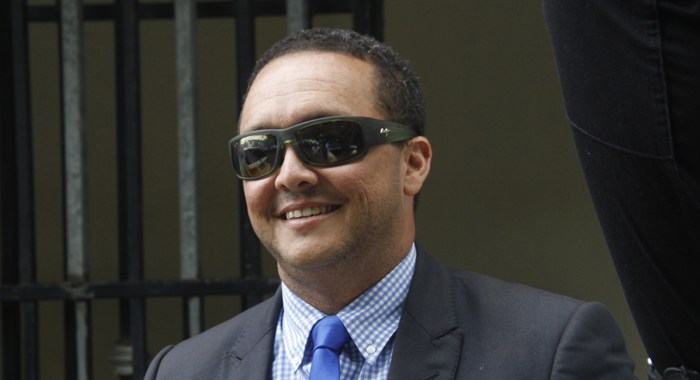The prosecution was left in an embarrassing position earlier yesterday when defense counsel Grant Connell informed the Serious Offences Court that one of three men on drug charges was previously convicted and sentenced to prison here on a number of drug charges – information which should have been presented to the court by the prosecution if provided by the police.
Senior Prosecutor Adolphus Delpesche made the comment after meeting in chamber with Chief Magistrate Rechanne Browne-Matthias and Connell.
The issue arose soon after the prosecutor read the facts of the arrest of convicted Barbadian drug dealer Joel Payne and St Lucian nationals Eric Samuel and Jessie St Cyr.
The three non-nationals were intercepted in a blue speedboat carrying 350 pounds of compressed marijuana off Sandy Bay during a joint operation led by Inspector Nolan Dallaway involving the Black Squad, the Narcotics Division and the Coast Guard.
The men appeared in court on Friday November 15, 2019, and pleaded guilty to charges that: (i) on Wednesday November 13, 2019, at Sandy Bay, they attempted to export 158,446 grammes (350) pounds of cannabis; (ii) on November 13, 2019, at Sandy Bay, they were in possession of 158,446 grammes (350) pounds of cannabis for the purpose of drug-trafficking; and (iii) ) on November 13, 2019, at Sandy Bay, they were in possession of 158,446 grammes (350) pounds of cannabis with intent to supply to another.
The non-nationals were also charged that on November 13, 2019, at Sandy Bay, St Vincent and the Grenadines; (i) being prohibited immigrants, they entered the state without passport; (ii) they entered the state at a place other than a port of entry; (iii) they entered the state by boat without consent of an immigration officer; and (iv) they knowingly and willfully allowed themselves to land in the state as prohibited immigrants.
They all pleaded guilty to the four immigration violations.
Chief Magistrate Rechanne Browne-Matthias said that because of the numerous charges the court needed time to look at the facts before presenting them. She ordered that St Cyr and Samuel be remanded to custody pending the presentation of the facts and for sentencing.
After presenting the facts, the Senior Prosecutor told the court that the men had no previous conviction.
Connell, who represented the St Lucians, then presented mitigating factors for his clients and suggested fines be imposed as penalties and deportation orders be made instead of imposing custodial sentences which would cause the state approximately $35,000 annually to feed each prisoner.
“Charge them and throw them out,” he suggested.
Connell said he wanted to be honest with the court. He told the Chief Magistrate that while the prosecution said that there was antecedent, the Barbadian national, indeed, had a previous conviction.
He told the court the Barbadian was convicted by the High Court in this country six years ago when he was sentenced on drug charges relating to a drug-bust involving 1,706 pounds of marijuana.
The Barbadian national confirmed to the court that he was imprisoned. He told the court he was released from prison in July last year.
To bolster his argument for a non-custodial penalty, Connell said that imprisonment had not been a deterrent.
Following Connell’s presentation, the Senior Prosecutor rose and told the Chief Magistrate that “an issue” had arisen “touching and concerning the matter” and he would like to discuss it with her and Connell. He made an application for the matter to be stood down to facilitate a meeting.
The Chief Magistrate immediately stood, suspended the court and headed for her chamber. She was followed by the prosecutor and the lawyer.
Antecedents play a vital role in assisting magistrates and judges in sentencing. If there is no record of previous conviction before the court, even in circumstances where it is known that a defendant has been previously convicted, the court is entitled to treat him/her as if he/she had none.
Thus, a defendant with antecedents may end up with lighter sentences that they deserve all because there is no record before the court.
When the court resumed sitting that morning, the Senior Prosecutor said the first thing he wanted to say was that he felt “really embarrassed” when it took the defense lawyer to inform the court that it one of the defendants had a previous conviction.
“For me, it is very embarrassing. This man has been in custody since the 13th (of November, 2019),” Delpesche told the court, indicating that the police had ample time to research the background of the defendants.
“So, I must thank the defense for their honesty,” the prosecutor said, adding that the Barbadian national would have been recorded by the Serious Offences Court as having no previous conviction.
“That having been said, your Honour, I am not looking for a custodial sentence,” the prosecutor told the Chief Magistrate, immediately taking his seat.
Chief Magistrate Browne-Matthias said she, too, was “concerned” that the issue of the Barbadian having a previous conviction in this country had to be brought to the attention of the court by the defense counsel.
The Chief Magistrate said that, as a result of the police failure to provide the antecedent record to the court it would go to the benefit of the Barbadian defendant.
While the Chief Magistrate commended corporal Caesar of the Black Squad for the arrest, she also said that “there must be further investigations” upon arrests “to uncover all stories.”
The men were each fined $38,700.00 to be paid forthwith for the drug charges. The prosecution withdrew the trafficking charge.
They were also fined a total of $1,400 each for the violation of the immigration laws.





1 Comment
This kind of sentence will encourage other traffickers to take the chance if they believe they will not get a custodial but will have to pay the equivalent of one week of their earnings. What a wonderful deal.